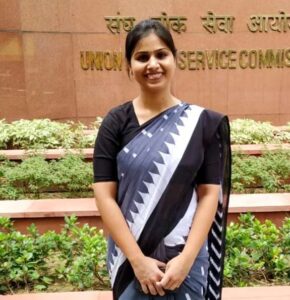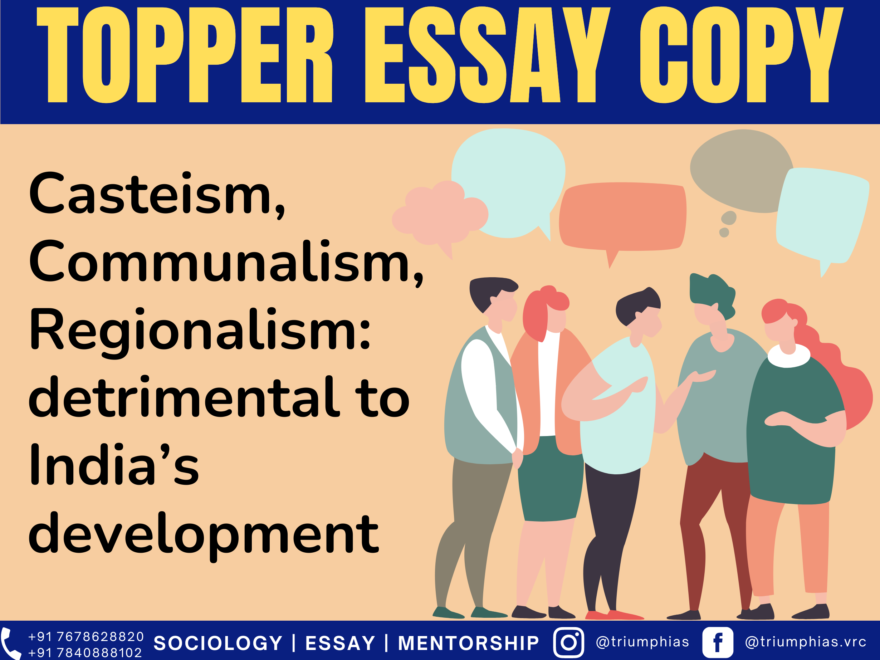IAS, ANKITA JAIN

Essay Topic:
Casteism, Communalism, Regionalism: detrimental to India’s development
(Relevant for Essay Writing for UPSC Civil Services Examination)
Casteism, Communalism, Regionalism: detrimental to India’s developmentThe word ‘development’ cannot be understood only in economic terms. It is an all-inclusive term. It means political, social, economic, cultural, and human development. Issues like casteism, communalism, and regionalism are detrimental to it. Casteism divides society into castes, communalism into religious followers, and regionalism into small regions. Thus, it defeats the very purpose of development. That is, the very purpose of development. That is, it defeats “SABKA SAATH, SABKA VIKAS.” Development without togetherness is fragmented. It is never complete, never a whole. In this essay, we shall all see how casteism, communalism, and regionalism impact India’s development. We shall also try to see how we can tackle these issues. Let us go down the memory lane and look at these issues of casteism, communalism, and regionalism. During the times of Ashoka, The Great, Indian society was divided into castes, religions, and regions. But yet the empire grew and society developed because the nation was united. Though labor was divided as per caste, Ashoka used to practice tolerance towards all religions. Thus, all regions prospered, and the Ashokan Empire was known for its strength. But later, the elements of casteism, communalism, and regionalism started making their way into Indian hearts. Consequently, by the time the British came to India, there were many rulers fighting for regions. This slowed down India’s ascent towards technology. Consequently, technological development and the sense of togetherness deteriorated. British rule fueled issues of casteism and communalism, especially after the revolt of 1875. Eventually, India’s development as a nation slowed down, and it took us 90 more years to become independent. In fact, at that time it was Gandhi who took issues of casteism, communalism, and regionalism seriously. He united India for a united struggle for freedom. This showed that the division of society “divided we were oppressed, but united we liberated our country.” But unfortunately, even after independence, we still face issues of casteism, regionalism, and communalism. The polarization of votes on communal lines, through caste appeals and the emergence of regional parties is evidence of it. This leads to the politicization of these issues. Consequently, we forget to note and debate on real issues of development and growth. Hence, it is detrimental to India’s development into a conscious and intelligent polity. We see division in society on these lines even in the economic sphere. Manual scavenging is still done by scheduled castes or so-called lower castes. This deprives the nation of useful labor. This is, in fact, a division of laborers in the words of Sr. B.R. Ambedkar. Similarly, riots on communal grounds such as anti-Sikh riots of 1984 and riots on son-of-the-soil policies inflict huge economic losses in terms of loss of lives, property, and merit. This is detrimental to our economic development. In turn, the above limitations affect our Indian society. It does not let us develop into a united nation. Mob lynching events due to caste, religion, and region create social distrust. It becomes difficult to trust each other and also the government. This distrust is detrimental to the development of India’s social fabric. What is more unfortunate is the role of media in such issues. For the sake of TRPs and audience, media tends to sensationalize news. Rohith Vemula’s suicide is a point in case. Media is the fourth pillar of democracy. But its flawed role is detrimental to India’s development into a strong and vibrant democracy. India is a vibrant democracy due to the vibrant and diverse cultures it has. Restrictions posed by casteism, communalism, and regionalism do not let India’s culture develop. They act as barriers to assimilation. The exodus of North-Eastern people from Bengaluru and constant insurgency in North-East testify to it. This shows that casteism, communalism, and regionalism are detrimental to assimilation and the development of Indian culture. These issues again pose a challenge if we try to have uniformity across Indians irrespective of caste, creed, religion, region, etc. The Uniform Civil Code is a point in case. It faces challenges from conservative attitudes of religious followers, castes, and regions. Thus, it does not develop into a truly secular system. In fact, religious aspirations and caste and regional issues when fanned by fanatics and extremists can be a threat to internal security. Naxalism in the Red Corridor, radicalization of Muslim youth in Kerala, and caste protests are some examples in this case. They are detrimental to India’s development into a safe and sound nation. This has indirect repercussions on Indian polity, society, and economy. From the above discussions, it is clear that these issues need to be resolved. The resolution lies in the implementation of government schemes and mechanisms such as devolution by the Finance Commission, affirmative action, PM Jan Vikas Yojana, Ek Bharat Shreshtha Bharat, etc. They need to be implemented effectively and efficiently. Further technological advancements in government offices, public and private spaces need to be done. This is because technology does not discriminate based on caste, creed, religion, region, etc., enabling e-governance in this sphere. Not only the government but society also needs to take responsibility. Though caste, religion, and region play a positive role by providing a sense of belonging to a community, the dominance of this identity over national identity needs to be checked. To illustrate this point further, regionalism in Spain is considered as a constituent part of nationalism. But in the end, society needs to eradicate issues of casteism, regionalism, and communalism from within. It is society from where they originated. As individuals, all of us can contribute to the development of India by following constitutional ideals of equality, fraternity, and secularism. This would bring a sense of togetherness and brotherhood that addresses issues of distrust and suspicion in society. Hence, it leads to the development of Indian society as a whole. This is related to our political, economic, and cultural development. To conclude, it is seen that casteism, communalism, and regionalism are detrimental to India’s development. They make our development process fragmented and skewed. To continue as a dynamic and lively democracy, India’s development has to be led by its people together because |
To master these intricacies and fare well in the Sociology Optional Syllabus, aspiring sociologists might benefit from guidance by the Best Sociology Optional Teacher and participation in the Best Sociology Optional Coaching. These avenues provide comprehensive assistance, ensuring a solid understanding of sociology’s diverse methodologies and techniques
Meta Tags:
Urbanisation, Blessing, Disguise, Economic Growth, Cultural Diversity, Environmental Challenges, India, Social Inclusion, Sustainable Development, SDG Goals, Urbanization is a blessing in disguise, Laxman Tiwari, Laxman Tiwari upsc, Laxman Tiwari CSE, Laxman Tiwari Essay copy, Laxman Tiwari Essay test copy

Why Vikash Ranjan’s foundation Classes for Essay?
Proper guidance and assistance are required to learn the skill of writing essay topics in CSE examination. VIKASH RANJAN SIR at TRIUMPH IAS guides students according to the Recent Trends of UPSC, making him the Best Essay Teacher for Essay writing UPSC.
At Triumph IAS, the Best Essay Writing Coaching platform, we not only provide the best study material and applied classes of Essay for IAS but also conduct regular assignments and class tests to assess candidates’ writing skills and understanding of the subject.
Choose The Best Essay Writing Teacher for IAS Preparation and Know our Approach for Essay?
- The Programme is Planned & Executed in a Way that You Write a good Essay for obtaining Effective Score of 140 Plus.
- In this programme we provide Classes on
- How to INTRODUCE The Topic in Context of the THEME of the Essay
- How to Elaborate & Explain the Topic-Theme on Temporal Scale & Sectoral Scale as well as Intellectual Scale in the MAIN BODY of the Essay.
- How to Sum up the Topic in CONCLUSION in Context of the Essay Topic Theme.
- ︎We will Teach You How to use the Knowledge Matrix of General Studies & Optional to write a Good Essay more Logically and Coherently.
- After the Classes You have to “Write to Learn & Learn to Score” .This means You have to Write the Essay Test Papers & Learn from the Feedback & Discussions.
Why Essay is Important and What We Offer in “Essay Test Series”?
- Triumph’s Essay Upgradation Test Series (Under Personal Guidance of Vikash Ranjan Sir) doesn’t only focus on improving student’s linguistic skills but also focus on improving student’s ability to comprehend the topic-sentence (subject) recall & relate the facts, concepts, propose thesis-statements, and logically assimilate the ideas & counter ideas with clarity in expression on temporal & Sectoral Scales of knowledge.
- Further students are provided one-on-one INTERACTION* Session with Vikash Ranjan Sir. Students get personal feedback on their strength and weaknesses, regarding what is ‘good about their essay and what more should be done to make it a better one’ by Vikash Ranjan Sir.
Why to take up this “Essay Test Series and Foundation” Course?
- Essay is Low hanging Fruit. Marks in Essay is Effectively Contributing in Final Selection in New Pattern of Mains Exam. With a Well Developed ‘Knowledge Matrix and Rigorous Practice’, One can Score upto 160 + in Essay. So IAS Aspirants should never Ignore Essay Preparation
- Inculcating Writing Competency in Essay for IAS, which is Different from Essay in English, Essay in School and College.
Follow us :



Find More Blogs…
| Compare and contrast Karl Marx’s and Max weber’s | Karl Marx- Historical Materialism |
| Position of Women In the Modern Indian Society | Sociology: Social system and pattern variables |
keyword: Casteism, Communalism, Regionalism: detrimental,Casteism, Communalism, Regionalism: detrimental,Casteism, Communalism, Regionalism: detrimental,Casteism, Communalism, Regionalism: detrimental,Casteism, Communalism, Regionalism: detrimental,Casteism, Communalism, Regionalism: detrimental,Casteism, Communalism, Regionalism: detrimental,Casteism, Communalism, Regionalism: detrimental,Casteism, Communalism, Regionalism: detrimental,Casteism, Communalism, Regionalism: detrimental,Casteism, Communalism, Regionalism: detrimental,Casteism, Communalism, Regionalism: detrimental,


